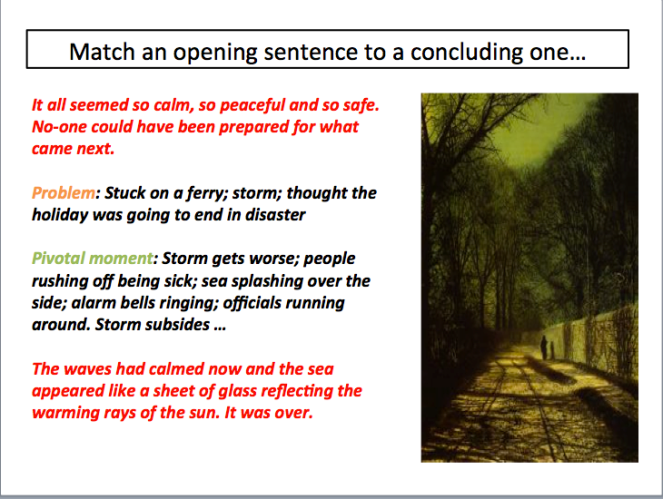Here are some of the slides we will be using for our writing revision. Remember, that for this question you need to write imaginatively. There are two questions to choose from: one might be a description based on an image; the other might be to write a story. However, both questions might ask you to write a story; equally, both questions might ask you to describe:
For example, one paper included these questions:
- Write a description of young children leaving home as suggested by this picture:
- Write a description about a person who has made a strong impression on you
Another paper included these:
- Write a story set on a dark night as suggested by this picture:
- Write a story about a game that goes badly wrong.
The important thing is to write in an engaging way. Think about the techniques you’re going to use – personification, metaphors etc. Describe the scene for your reader – pathetic fallacy, for example. Foreshadowing is good – hint at the events to come.
Don’t try and write loads – there is no correlation between the weight of an exam paper and the grade it receives. Two sides of tightly controlled writing can be impressive.
Clear and linked paragraphs. Think about how this will happen. Is your narrative chronological? Flashback? Signal the shifts CLEARLY to your reader.
Use a range of sentence and paragraph lengths. DELIBERATELY build in short sentences for effect; a short(er) paragraph. Some repetition. Three part lists etc.
VOCAB – this appears in the AO5 and AO6 mark scheme. This is from the level 4 descriptors for AO5: Extensive and ambitious vocabulary with sustained crafting of linguistic devices.
And this is from the level 4 descriptors for AO6: Extensive and ambitious use of vocabulary
This doesn’t mean you need to have swallowed a dictionary but some carefully chosen words can be effective. You have these in your armoury: how many different words for ‘running’ can you think of, for example?
Equally, simple words in a different context can be effective. Here is a sentence from Flannery O’Connor’s novel, Wise Blood:
“The train was racing through tree tops that fell away at intervals and showed the sun standing, very red, on the edge of the farthest woods.”
Using the phrase ‘fell away’ personifies the trees and feels quite dramatic, as if the landscape moves at will. Using the word ‘standing’ to describe the sun is also effective. What word would you normally use? Glowed? Shone? The sun WAS red? By using the word ‘standing’ the writer offers a lovely contrast between the movement of the train and the trees and the stillness of the sun. Now although these are relatively simple words, it is the USE of them that is ambitious.
This is the opening sentence to one of my favourite novels, The New York Trilogy by Paul Auster.
“It was a wrong number that started it, the telephone ringing three times in the dead of night, and the voice on the other end asking for someone he was not”
First of all, the sentence begins the story in medias res – Latin for ‘in the middle of things’. No messing about – get your reader hooked. Look at the vocabulary though: simple words, but assembled in a thought-provoking way. How many less interesting ways could Auster have begun his story? “The phone rang; I answered it, but it was a wrong number.”? Instead, look at the addition of the phrase ‘that started it’. Started what? Auster is already drawing our attention to the importance of the call and ‘it’ adds to the mystery of the problem that the protagonist will eventually face. The simple – and possibly cliched phrase – “dead of night” emphasises the suddenness of the event and reinforces the sense of intrusion created by the phone call. Why three times as well? But for me, the final phrase ‘asking for someone he was not’ is also effective. Not ‘asking for someone else’ but ‘someone he was not’. It points to ideas about identity (which is what the book is about amongst other things). The sentence is unadorned – low on adjectives, techniques but it’s a great opening.
For our revision session, we’ll be looking at planning narratives. Here are some ideas that we will go through in the session. We might not get round to all of them, but I’ve included all the slides here for reference. You will have better ideas. But use these as a springboard for thinking.






One way of planning:





And here’s a planning frame to help you

outstanding
LikeLike
Well, this substance has just blown up my mind!
So many interesting facts and critical examples that I am astonished and highly satisfied with the information you give us.
The topic is burning as well, so I suggest I’ll read it twice, as I did
with this article https://bezbeliapstraklije.com/dissertation-editing/. Last
but not least is I can share this information with friends of mine
and get their pleasure from the given material as well.
Let such info to be!
LikeLike